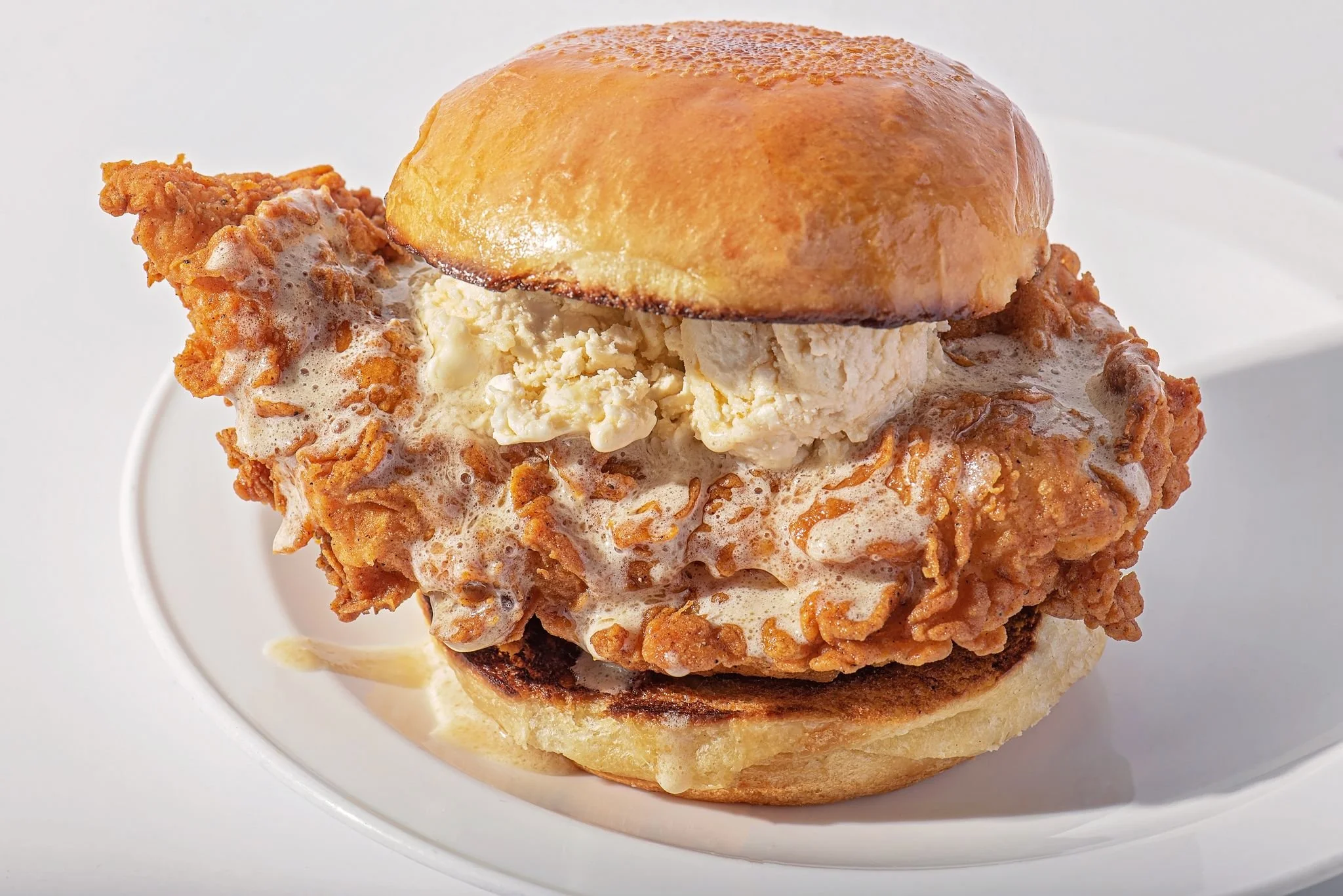Queen Mother’s: Chef Rock Harper is Changing the Chicken Sandwich Game with History and Respect
Photos by Melena Shonell, Rock Harper and DoorDash. Originally published in AphroChic magazine Issue 10, Fall 2022.
Fast food is usually the last place anyone would look for a history lesson, a social conscience or a message of change. And maybe that’s the problem. In a world where fast food is often the only food available in our communities, is there any reason why it shouldn’t be a force for good, serving healthy food while encouraging community togetherness and mutual respect? Chef Rock Harper says no, and he’s proving his point with Queen Mother’s, his new Arlington, Virginia-based restaurant that’s aiming to change the way we see fried chicken, and a few other things as well.
If you’re a fan of reality cooking shows, chances are you know who Rock Harper is. In 2007 he exploded onto the the public stage as the season 3 winner of Gordon Ramsay’s popular Hell’s Kitchen competition. Since then Rock’s career has flourished, culminating in the opening of Queen Mother’s. But where many of the giants in the chicken game lean on plantation owners and mammy figures to symbolize their brands, Rock’s inspiration is altogether different.
“My mom,” he smiles, “she’s my Queen Mother.” The connection between Rock’s mom and his craft, and all the meaning he derives from it is an inspiration that goes back to his youngest days and his very first memories. “My mother and grandmother were the cooks,” he remembers. “Also some aunts, and uncles, my grandfather could make a mean batch of potatoes, and fish.” For Rock’s family food was more than sustenance it was communication, both a way to speak and a means of facilitating that speech. “It was an opportunity to connect. Our family's very social and food was always a way for us to gather. We’d crack jokes, play the Dozens and fellowship with one another. And it laid the groundwork for me to do everything I do today.”
What Rock is doing today, is putting every other chicken sandwich in the game on notice: the Queen reigns alone. A perfect, upscale boutique-style approach to chicken sandwiches, Queen Mother’s offers svelte menu with a curated selection of sandwich options, an arsenal of sauces, near-and-dear sides like dirty rice and cole slaw, and — in what can only be termed a stroke of pure genius — crinkle fries made with duck fat. But Queen Mother’s isn’t just changing the game with the menu. It has a different perspective on what fast food can mean to a community. The chef ensures that the chickens he serves are organically fed and humanely kept, his spices are all natural and his packaging is plant-based and compostable. Rock connects with his customers and invites them to rediscover their connections with each other through special take-out dinners for Mother’s Day and partnerships with local shelters to provide food through a program he calls “Buy One, Give One.”
It’s no surprise to find Rock still up to his elbows in chicken 15 years after it propelled him into the winners circle of Hell’s Kitchen. It was confidence in himself and his food culture that motivated him to present a plate of fried chicken to one of the world’s most famous and decorated chefs in his bid to be named the best. That sense of self is no small thing in a culinary world that still reserves its highest praises for European traditions and those who cook within them. But Rock’s relationship to fried chicken is special. Not just a comfort food, Rock sees fried chicken as the intersection of a number of historical, social and economic issues that have been impacting Black people for centuries.
Reluctant to be termed a scholar on the topic, Rock is nevertheless quick to point out the hypocrisy of one of the world’s most consumed foods being specifically linked to Black people through satire and stereotype, while simultaneously being claimed as the centerpiece of a “Southern” cooking tradition attributed primarily to white Americans and their European ancestry. “There's a lot of people who say fried chicken comes from the Scots,” he reveals, adding that the first American fried chicken recipe is widely credited to southern heiress, Mary Randolph, in her 1824 cookbook, The Virginia Housewife.
Rock rejects the theory that fried chicken is a Scottish invention, pointing out — as others have — the existence of precolonial West African traditions of frying chicken in palm oil as well as the extent to which Mary Randolph drew on the expertise of the enslaved women who worked her kitchens. Likely, what we know today as fried chicken developed from a combination of African and Scottish methods while bearing little resemblance — particularly in sandwich form — to either. But the real question is why any of this matters.
“It's a repositioning of ownership,” Rock explains. “I’m frying chicken. There’s a lot that comes with that and I'm all for it. But I want Black folks to recognize that this thing is a billion dollar industry that we do not participate in in a significant way.” Juxtaposed against the prevailing sentiment, even in our own community, that traditionally Black foods like chicken and other soul food staples are “low brow” Rock struggles with the disconnect, and thinks that we should too. “I don't get invited to some of the things that I used to get invited to,” he confesses, because they don't want some dude talking about fried chicken.” This too seems incongruous, Rock observes, given the role that Black people, especially Black women, have played in history of fried chicken, not only perfecting the art of making it, but creating the business of selling it. Black women have been selling fried chicken since the 1700s. After the Civil War, “waiter carriers,” Black women in Gordonville, Virginia and elsewhere found economic empowerment selling fried chicken meals at train stations — a legacy that Gordonville celebrates every year. Immersed in this history, Rock works to remind us of how our food traditions encourage us look past what we’re told we can be to celebrate what we are — starting with our mothers.
“One of my responsibilities as a Black chef is to reframe how we talk about Black women and food,” he asserts. “I think I cook an incredible Yardbird. But it’s not super important that everybody says it's the best fried chicken. It's really important that people understand what fried chicken means and why I chose it right now. Obviously, we're way more dynamic and multifaceted than just fried chicken. But this is what I choose to use, because if I can use the least thing among us, the thing that has been weaponized against us, for us gain some empowerment, why am I trying to cook somebody else's food? This is literally in my blood; literally in my veins. Why on earth am I running away from it?”











